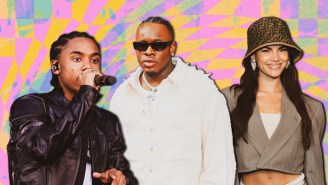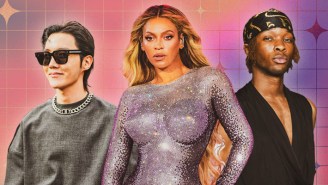Though many a Hollywood actress shies away from the term, Emma Watson’s never been afraid to call herself a feminist. She’s also never been afraid to encourage other women — and men — to do the same: She’s spoken out about equal rights as a UN Women Goodwill Ambassador, encouraged men to get down with the cause with her “He For She” campaign, and now, she’s apparently inspired one of the world’s most powerful young activists to proudly identify herself as a feminist, as well.
At the Into Film Festival, a “free and annual celebration of film and education for 5 to 19-year-olds” set in the UK, Watson sat down with Malala Yousafzai, the youngest-ever Nobel Prize winner and the subject of the newly released documentary He Named Me Malala. Yousafzai, who was shot in the head by the Taliban after publicly insisting that young women have a right to an education, has since done much difficult and dangerous work for her cause, opening her own foundation and traveling the world speaking out about the significance of sending girls to school despite continued threats against her life. But, as she revealed to Watson yesterday, Yousafzai wasn’t prepared to call herself a feminist until she heard Watson’s “He For She” speech.
“This word, feminism, has been a tricky word,” admitted Yousafzai during the wide-ranging conversation, in which the two discussed the power of education and the goals of the The Malala Fund. “When I heard it the first time, I heard some negative responses and some positive ones, and I hesitated in saying, ‘Am I a feminist or not?’ Then after hearing your speech, when you said, ‘If not now, when? If not me, who?’ I decided there’s no way and there’s nothing wrong by calling yourself a feminist. So, I am a feminist and we all should be a feminist because feminism is another word for equality.”
Merely using the word “feminist” might seem relatively insignificant compared to the tangible, life-endangering work Yousafzai’s done for years. But Yousafzai herself has often spoken about the power of words, about how language itself can shift perception. In 2013, she told the UN, “We will speak for our rights and we will bring change through our voice. We must believe in the power and the strength of our words. Our words can change the world.”
For her part, Watson was pleasantly “shocked” that Yousafzai vocally identified with the movement. “I had initially planned to ask Malala whether or not she was a feminist, but then researched to see whether she had used this word to describe herself,” Watson wrote in a Facebook post accompanying a video of the interview. “Having seen that she hadn’t, I decided to take the question out before the day of our interview. To my utter shock, Malala put the question back into one of her own answers and identified herself.”
“I think this gesture is so emblematic of what Malala and I went on to discuss. I’ve spoken before on what a controversial word feminism is currently,” she added. “We are all moving towards the same goal. Let’s not make it scary to say you’re a feminist. I want to make it a welcoming and inclusive movement. Let’s join our hands and move together so we can make real change. Malala and I are pretty serious about it but we need you.”






